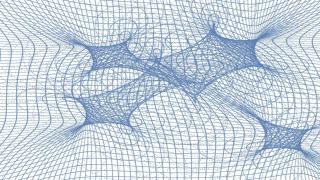Bibcode
Mediavilla, E.; Jimenez-Vicente, J.; Muñoz, J. A.; Mediavilla, T.; Ariza, O.
Referencia bibliográfica
The Astrophysical Journal, Volume 798, Issue 2, article id. 138, 11 pp. (2015).
Fecha de publicación:
1
2015
Revista
Número de citas
20
Número de citas referidas
20
Descripción
We use the statistics of caustic crossings induced by microlensing in
the lens system Q 2237+0305 to study the lens galaxy peculiar velocity.
We calculate the caustic crossing rates for a comprehensive family of
stellar mass functions and find a dependence of the average number of
caustic crossings with the effective transverse velocity and the average
mass, < n > \propto {veff / \sqrt{< m > }},
equivalent to the theoretical prediction for the case of microlenses
with identical masses. We explore the possibilities of the method to
measure v eff using the ~12 yr of Optical Gravitational
Lensing Experiment monitoring of the four images of Q 2237+0305. To
determine a lower limit for v eff, we count, conservatively,
a single caustic crossing for each one of the four high magnification
events identified in the literature (plus one additional proposed by us)
obtaining veff ≳ 240\sqrt{< m > /0.17 M_ȯ }
km s-1 at 68% of confidence. From this value and the average
FWHM of the four high magnification events, we obtain a lower limit of
rs ≳ 1.4 \sqrt{< m > /0.17 M_ȯ } light-days
for the radius of the source (rs = FWHM/2.35). Tentative
identification of three additional caustic crossing events leads to
estimates of veff≃ (493+/- 246)\sqrt{< m > /0.17
M_ȯ } km s-1 for the effective transverse velocity and
of rs ≃ (2.7+/- 1.3)\sqrt{< m > /0.17 M_ȯ }
light-days for the source size. The estimated transverse peculiar
velocity of the galaxy is vt ≃ (429+/- 246)\sqrt{< m
> /0.17 M_ȯ } km s-1.
Proyectos relacionados

Astrofísica Relativista y Teórica
El estudio de las lentes gravitatorias proporciona poderosas herramientas en Astrofísica y Cosmología. Las principales aplicaciones de las lentes gravitatorias en las que se centra este proyecto son las siguientes: (i) estudiar la presencia de subestructura de materia obscura en las galaxias lente a partir de las anomalías en la magnificación de
Evencio
Mediavilla Gradolph